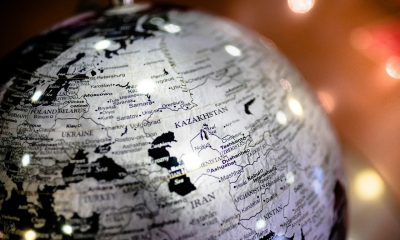EU
Per savo 90-ąjį gimtadienį #GeorgeSoros perspėja: „Europa yra pažeidžiama priešų, tiek viduje, tiek išorėje“

 In an interview published on his ninetieth birthday (12 August), financier and philanthropist George Soros (nuotraukoje) argues that the coronavirus pandemic is “the worst crisis in my lifetime since the Second World War”. He believes that the crisis is making people “disoriented and scared” which will lead to “them doing things that are bad for them and the world”.
In an interview published on his ninetieth birthday (12 August), financier and philanthropist George Soros (nuotraukoje) argues that the coronavirus pandemic is “the worst crisis in my lifetime since the Second World War”. He believes that the crisis is making people “disoriented and scared” which will lead to “them doing things that are bad for them and the world”.
This could include an acceptance of harmful “instruments of surveillance produced by artificial intelligence", which he argues could become acceptable even in democratic countries because of their use in bringing the virus under control. However, despite this warning, he sees events as unpredictable. We are in a “revolutionary moment” where “the range of possibilities is much greater than in normal times”.
In the interview, published in Respublika and conducted by Italian journalist Mario Platero in New York, Soros also expresses concerns about the future of the European Union (EU) and its vulnerability to “enemies, both inside and out”.
Europe’s enemies, he argues, share a common feature in their “opposition to the open society”. The greatest of these enemies is China, which has recently overtaken Russia as Europe’s greatest foe due to its use of artificial intelligence, which “produces instruments of control that are helpful for a closed society and represent a mortal danger to an open society”.
However, Europe is making itself vulnerable because it is an “incomplete union” that does not have enough money to cope with the twin challenges of the fall-out from COVID-19 and climate change. The recent European Council meeting on the recovery fund was a “dismal failure, he argues,” that will “yield too little money too late”.
Though Soros singles out Chancellor Merkel for praise, he argues that she is “up against deeply engrained cultural opposition”. Germany’s cultural abhorrence of debt is a barrier that is preventing the EU from responding to the scale of events. “The German word Schuld has a double meaning. It means debt and guilt. Those who incur a debt are guilty. This doesn't recognize that the creditors can also be guilty. It is a cultural issue that runs very, very deep in Germany.”
Soros argues that responsibility for the inadequate recovery plan lies with the so-called Frugal Five – the Netherlands, Austria, Sweden and Denmark and Finland – who watered down the agreement. Tragically, he argues, these “basically pro-European countries but are acting in a “very selfish” manner, which has led to the scaling back of plans on climate change and defence policy, and created problems for the southern state that were hardest hit by the virus.
Soros concedes that there is now not enough time for his long-standing proposal that the EU adopt perpetual bonds or “Consols” to be accepted. These bonds, in which only the annual interest has to ever be repaid, could raise £1 trillion at a low cost “at a time when it is urgently needed” he argues. However, the opposition of the “Frugal Five” to giving the EU tax-raising powers, means that “the issuing of perpetual bonds in the near future is impossible”. Unless these countries become “enthusiastic supporters” the issuing of perpetual bonds by the EU: “The European Union may not survive” which would be a “grievous loss not only to Europe but to the whole world”.
He also warns that Viktor Orbán in Hungary and Jaroslaw Kaczyński in Poland, have “captured the government” and, despite being the “largest recipients of EU structural aid”, are “opposed to the values upon which the EU was founded”.
However, his “biggest concern is Italy” where public support for remaining a member of the eurozone is diminishing and politics is shifting towards the “extremist” right, in the form of Giorgia Meloni and her party, Fratelli d’Italia. “I cannot imagine an EU without Italy.” Soros notes: The big question is whether the EU will be able to provide enough support”.
He concludes that Europe is “much more vulnerable” than the United States, which has a tradition of checks and balances, established rules and “above all, the Constitution”. “Confidence trickster” Trump will be a “temporary phenomenon” but “remains very dangerous” as he is fighting for his political life and will do anything to stay in power” since, “he has violated the constitution” and “if he loses the presidency will be held accountable”.
Soros makes his first public comments on the Juoda gyvena medžiaga judėjimas, arguing that it is the “first time a large majority of the population, other than black people, recognizes that there is systemic discrimination”. Finally, when questioned about “cancel culture” he urges calm. It is a temporary phenomenon” and political correctness in universities is “way exaggerated”, though as an “advocate of an open society” he considers “political correctness politically incorrect”. We should “never forget that a plurality of views is essential for open societies”, Soros concludes.
Mario Platero's interview with George Soros, in Southampton (New York)
Q) The novel coronavirus has disrupted the life of every person on earth. How do you see the situation?
A) We are in a crisis, the worst crisis in my lifetime since the Second World War. I would describe it as a revolutionary moment when the range of possibilities is much greater than in normal times. What is inconceivable in normal times becomes not only possible but actually happens. People are disoriented and scared. They do things that are bad for them and for the world.
Q) Are you also confused?
A) Perhaps a little less than most people. I have developed a conceptual framework that puts me slightly ahead of the crowd.
Q) So how do you see the situation in Europe and the United States?
A) I think Europe is very vulnerable, much more so than the United States. The United States is one of the longest-lasting democracies in history. But even in the United States, a confidence trickster like Trump can be elected president and undermine democracy from within.
But in the US you have a great tradition of checks and balances and established rules. And above all you have the Constitution. So I am confident that Trump will turn out to be a transitory phenomenon, hopefully ending in November. But he remains very dangerous, he's fighting for his life and he will do anything to stay in power, because he has violated the Constitution in many different ways and if he loses the presidency he will be held accountable.
But the European Union is much more vulnerable because it is an incomplete union. And it has many enemies, both inside and outside
Q) Who are the enemies inside?
A) There are many leaders and movements that are opposed to the values upon which the European Union was founded. In two countries they have actually captured the government, Viktor Orbán in Hungary and Jaroslaw Kaczyński in Poland. It so happens that Poland and Hungary are the largest recipients of the structural fund distributed by the EU. But actually my biggest concern is Italy. A very popular anti-European leader, Matteo Salvini, was gaining ground until he overestimated his success and broke up the government. That was a fatal mistake. His popularity is now declining. But he has actually been replaced by Giorgia Meloni of Fratelli d’Italia, who is even more of an extremist. The current government coalition is extremely weak.
They are only held together to avoid an election in which the anti-European forces would win. And this is a country that used to be the most enthusiastic supporter of Europe. Because the people trusted the EU more than their own governments. But now public opinion research shows that the supporters of Europe are shrinking and the support for remaining a member of the eurozone is diminishing. But Italy is one of the biggest member, it is too important for Europe. I cannot imagine a EU without Italy. The big question is whether the EU will be able to provide enough support to Italy.
Q) The European Union has just approved a €750 billion recovery fund…
GS: That’s true. The EU took a very important positive step forward by committing itself to borrow money from the market on a much larger scale than ever before. But then several states, the so-called Frugal Five – the Netherlands, Austria, Sweden and Denmark and Finland – managed to make the actual agreement less effective. The tragedy is that they are basically pro-European, but they are very selfish. And they are very frugal. And, first, they led to a deal which will prove inadequate. The scale back of plans on climate change and defense policy is particularly disappointing. Secondly, they also want to make sure that the money is well spent. That creates problems for the southern states that were the hardest hit by the virus.
Q) Do you still believe in a European perpetual bond?
A) I haven’t given up on it, but I don’t think there is enough time for it to be accepted. Let me first explain what makes perpetual bonds so attractive and then explore why it is an impractical idea at the present time. As its name suggests the principal amount of a perpetual bond never has to be repaid; only the annual interest payments are due. Assuming an interest rate of 1%, which is quite generous at a time when Germany can sell thirty year bonds at a neigiamas interest rate, a €1 trillion bond would cost €10 billion per year to service. This gives you an amazingly low cost/benefit ratio of 1:100. Moreover, the €1 trillion would be available immediately at a time when it is urgently needed, while the interest has to be paid over time and the longer out you go the smaller its discounted present value becomes. So what stands in the way of issuing them? The buyers of the bond need to be assured that the European Union will be able to service the interest. That would require that the EU be endowed with sufficient resources (i.e. taxing power) and the member states are very far from authorizing such taxes. The Frugal Four – the Netherlands, Austria, Denmark, Sweden (they are now five because they were joined by Finland) - stand in the way. The taxes would not even need to be imposed, it would be sufficient to authorize them. Simply put, this is what makes issuing perpetual bonds impossible.
Q) Can’t Chancellor Merkel, who is determined to make the German presidency a success, do something about it?
A) She is doing her best but she is up against a deeply engrained cultural opposition: the German word Schuld has a double meaning. It means debt and guilt. Those who incur a debt are guilty. This doesn't recognize that the creditors can also be guilty. It is a cultural issue that runs very, very deep in Germany. It has caused a conflict between being German and European at the same time. And it explains the recent decision of the German Supreme Court that is in conflict with the European Court of Justice.
Q) Who are the enemies of Europe on the outside?
A) They are numerous but they all share a common feature: they are opposed to the idea of an open society. I became an enthusiastic supporter of the EU because I considered it an embodiment of the open society on a European scale. Russia used to be the biggest enemy but recently China has overtaken Russia. Russia dominated China until President Nixon, understood that opening and building up China would weaken Communism not only but also in the Soviet Union. Yes, he was impeached, but he, together with Kissinger were great strategic thinkers. Their moves led to the great reforms of Deng Xiaoping.
Today things are much different. China is a leader in artificial intelligence. Artificial intelligence produces instruments of control that are helpful for a closed society, and represent a mortal danger for an open society. It tilts the table in favor of closed societies. Today's China is a much bigger threat to open societies than Russia. And in the US there is a bipartisan consensus that has declared China a strategic rival.
Q) Coming back to the novel coronavirus, is it helpful or harmful to open societies?
A) Definitely harmful because the instruments of surveillance produced by artificial intelligence are very useful in bringing the virus under control and that makes those instruments more acceptable even in open societies.
Q) What made you so successful in the financial markets?
A) As I mentioned before, I have developed a conceptual framework that gave me an advantage. It is about the complex relationship between thinking and reality, but I have used the market as a testing ground for the validity of my theory. I can sum it up in two simple propositions. One is that in situations that have thinking participants the participants' view of the world is always incomplete and distorted. That is fallibility. The other is that these distorted views can influence the situation to which they relate and distorted views lead to inappropriate actions. That is reflexivity. This theory gave me a leg up, but now that my “Alchemy of Finance” is practically compulsory reading for professional market participants I have lost my advantage. Recognizing this, I am now no longer a market participant.
Q) Does your framework tell you to worry about the perceived disconnect between market valuations and the weakness of the economy? Are we in a bubble fueled by the huge liquidity made available by the Fed?
A) You hit the nail on the head. The Fed did much better than President Trump who criticized it. It flooded the markets with liquidity. The market is now sustained by two considerations. One is that it expects an even larger injection of fiscal stimulus than the $1.8 trillion CARES Act in the near future; the other is that Trump will announce a vaccine before the elections.
Q) You recently donated US$220 million to the cause of racial equality and black causes. How do you assess the Black Lives Matter movement?
A) It really matters, because this is the first time that a large majority of the population, other than black people, recognizes that there is systemic discrimination against blacks that can be traced back to slavery.
Q) Many say that after COVID-19 and the remote working experience, the future of cities and metropolitan areas is doomed.
A) Many things will change but it is too early to predict how. I remember that after the destruction of the Twin Towers in 2001, people thought that they will never want to live in New York and in a few years, they forgot it.
Q) In this revolution, statues are coming down and political correctness is becoming paramount.
A) Some call it the cancel culture. I think it's a temporary phenomenon. I think it's also overdone. Also political correctness in universities is way exaggerated. As an advocate of open society I consider political correctness politically incorrect. We should never forget that a plurality of views is essential for open societies.
Q) If you could send a message to the people of Europe what would it be?
A) SOS. While Europe is enjoying its usual August vacation, the traveling involved may have precipitated a new wave of infections. If we look for a parallel, the Spanish Flu epidemic of 1918 comes to mind. It had three waves, of which the second was the most deadly. Epidemiology and medical science have made great strides since then and I am convinced a repeat of that experience can be avoided. But first the possibility of a second wave has to be acknowledged and immediate steps taken to avoid it. I am not an expert in epidemiology but it is clear to me that people using mass transportation should wear facemasks and take other precautionary measures.
Europe faces another existential problem: it does not have enough money to deal with the twin threats of the virus and climate change. In retrospect it is clear that the in-person meeting of the European Council was a dismal failure. The course on which the European Union has embarked will yield too little money too late. This brings me back to the idea of perpetual bonds. In my opinion, the Frugal Four or Five need to recognize this; instead of standing in the way they should turn into enthusiastic supporters. Only their genuine conversion could make perpetual bonds issued by the EU acceptable to investors. Without it, the European Union may not survive. That would be a grievous loss not only for Europe but for the whole world. This is not only possible, but may actually happen. I believe that under pressure from the public, the authorities could prevent it from happening.
Pasidalinkite šiuo straipsniu:
-

 Konfliktaiprieš 3 dienas
Konfliktaiprieš 3 dienasKazachstanas žengia: Armėnijos ir Azerbaidžano takoskyros tiltas
-

 Skaitmeninių paslaugų įstatymasprieš 5 dienas
Skaitmeninių paslaugų įstatymasprieš 5 dienasKomisija ėmėsi veiksmų prieš Meta dėl galimų Skaitmeninių paslaugų įstatymo pažeidimų
-

 Išplėtimasprieš 4 dienas
Išplėtimasprieš 4 dienasES prisimena 20 metų senumo optimizmą, kai įstojo 10 šalių
-

 Covid-19prieš 3 dienas
Covid-19prieš 3 dienasPažangi apsauga nuo biologinių veiksnių: itališka ARES BBM sėkmė – biologinė barjerinė kaukė























